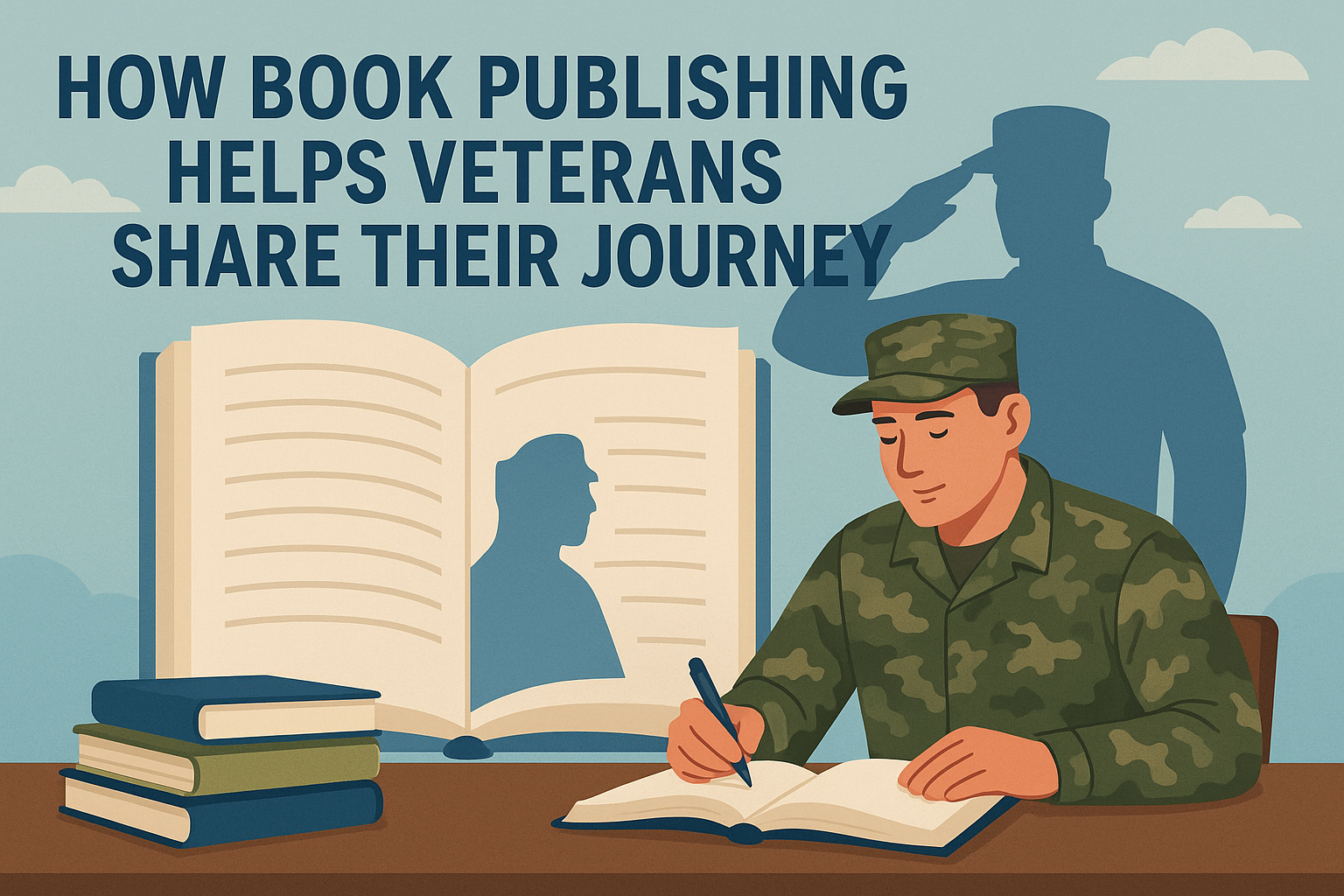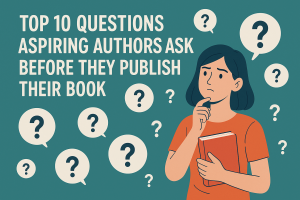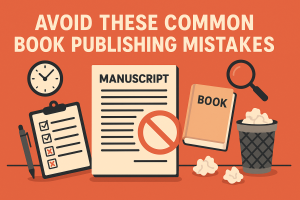War Stories: The act of storytelling has been a fundamental part of human experience since time immemorial, serving as a bridge between different worlds and experiences. For veterans who have witnessed the raw realities of conflict, storytelling through book publishing becomes not just a creative outlet, but a powerful form of healing and connection. The publishing industry has increasingly recognized the unique value and perspective that veterans bring to literature, creating pathways for these important voices to be heard.
Veterans’ narratives contribute significantly to our collective understanding of war, sacrifice, and resilience. Through book publishing, these stories transform from personal memories into shared experiences that educate civilians, connect veterans to one another, and preserve crucial historical accounts from those who lived through defining moments in history. The journey from battlefield to bookshelf represents not just a personal accomplishment for veteran authors but an important cultural contribution that enriches our literary landscape.
In recent years, the accessibility of book publishing services has democratized the process, allowing more veterans to share their unique perspectives. Whether through traditional publishing houses or affordable book publishing services, the barriers to entry have diminished, creating unprecedented opportunities for military voices to reach wider audiences. This evolution in the publishing industry has coincided with growing public interest in authentic war narratives told by those who experienced them firsthand.
The Therapeutic Value of Writing for War Stories
Writing serves as a powerful therapeutic tool for many veterans navigating the complex aftermath of military service. The process of translating chaotic, traumatic, or profound experiences into coherent narratives helps create meaning and order from events that often defy simple understanding. Psychologists and healthcare professionals increasingly recognize that the act of writing about traumatic experiences can produce measurable improvements in mental health outcomes for veterans dealing with PTSD, moral injury, and the challenges of civilian reintegration.
When veterans put pen to paper, they engage in what therapists call “narrative exposure therapy,” confronting difficult memories by structuring them into stories with beginnings, middles, and ends. This process helps transform fragmented, intrusive memories into coherent narratives that can be better integrated into a veteran’s life story. By working with book publishing services, veterans take this therapeutic writing process a step further, transforming private healing exercises into published works that can touch countless lives.
The structured nature of preparing a manuscript for publication, developing characters, creating plot arcs, refining language, and working with editors provides veterans with a framework for processing experiences that might otherwise remain locked in memory. Veterans who have chosen to get a book published often report that the rigorous editing process helped them gain new perspectives on their experiences, identifying patterns and meanings they hadn’t previously recognized. The discipline required to complete a book-length manuscript also provides a sense of purpose and accomplishment that many veterans seek after leaving military service.
Beyond individual therapy, veterans’ writing groups have emerged across the country, creating communities where military experiences can be shared, shaped into compelling narratives, and prepared for wider audiences. These groups often serve as stepping stones to publication, with members supporting each other through the challenges of the writing and publishing process. The camaraderie found in these writing communities can mirror the close bonds formed during military service, providing a sense of belonging that many veterans miss in civilian life.
Historical Context: From World War Memoirs to Modern War Stories
The tradition of veterans chronicling their wartime experiences stretches back centuries, but the modern military memoir as we know it emerged dramatically following World War I. The unprecedented scale and mechanized nature of that conflict produced a generation of soldier-writers whose unflinching accounts forever changed how society understood warfare. Works like Erich Maria Remarque’s “All Quiet on the Western Front” and Ernest Hemingway’s “A Farewell to Arms” established the veteran’s narrative as a powerful literary form that could convey truths about war that news reports and history books could not capture.
World War II further expanded this literary tradition, with classics like Eugene Sledge’s “With the Old Breed” and Kurt Vonnegut’s “Slaughterhouse-Five” demonstrating the range of approaches veterans could take to writing about war stories from meticulous documentation to surrealist reflection. The Vietnam War produced another wave of veteran literature, often characterized by moral complexity and cultural critique, exemplified by works like Tim O’Brien’s “The Things They Carried” and Philip Caputo’s “A Rumor of War.”
The conflicts in Iraq and Afghanistan have generated their own distinctive body of veteran literature, reflecting the unique characteristics of these wars: their length, the multiple deployments many service members experienced, the unclear objectives, and the technological innovations that shaped these conflicts. Books like Kayla Williams’ “Love My Rifle More Than You,” David Finkel’s “Thank You for Your Service,” and Phil Klay’s “Redeployment” have brought contemporary war experiences to civilian readers through various forms, from memoir to journalism to short fiction.
Today’s evolving book publishing landscape has created space for voices and perspectives that have historically been marginalized in war literature. Female veterans, LGBTQ+ service members, and veterans of color are increasingly getting their books published, expanding and diversifying the canon of military literature. These emerging voices are reshaping our collective understanding of war by highlighting experiences and viewpoints that have too often been overlooked in traditional war narratives.
Navigating the Publishing Landscape: Options for Veteran Authors
For veterans looking to share their stories, today’s publishing industry offers more pathways than ever before. Understanding the range of book publishing options available is crucial for veteran authors seeking the right home for their unique narratives. Each publishing route carries distinct advantages and considerations that align differently with individual goals and resources.
Traditional Publishing Houses
Major publishing houses continue to seek compelling military narratives, particularly those that offer fresh perspectives or address contemporary conflicts. These publishers provide professional editing, design, marketing, and distribution services, typically offering authors advances against future royalties. For veterans whose manuscripts have broad commercial appeal, connecting with literary agents who specialize in military memoirs or fiction can be the first step toward securing a contract with these established publishers.
Working with traditional publishers offers veterans the benefit of experienced editorial guidance, professional book design, and established distribution networks. However, this path is highly competitive, with publishers accepting only a small percentage of submitted manuscripts. The selection process often favors veterans whose stories align with current market interests or who have established platforms through media appearances, speaking engagements, or significant social media followings.
Independent and Small Press Publishers
Between major publishing houses and self-publishing lies a robust middle ground of independent and small press publishers, many of which specialize in military literature. These publishers often take more risks on unconventional narratives and may offer more personalized attention throughout the publishing process. While their distribution reach may be smaller than major houses, many independent publishers have developed dedicated readerships interested in authentic military accounts.
Several presses focus specifically on veteran writers, functioning as both publishing entities and supportive communities. These specialized publishers understand the unique challenges veteran authors face and may offer workshops, mentoring, or other resources to help develop manuscripts before publication. For veterans whose stories might not fit neatly into commercial categories but still deserve a place in the literary conversation about war stories, these targeted publishers can be ideal partners.
Self-Publishing and Hybrid Options
The digital revolution has dramatically expanded self-publishing options, creating affordable book publishing services that put production and distribution control directly in authors’ hands. For veterans with limited budgets but powerful stories to tell, these services provide accessible entry points to the publishing world. Digital platforms allow veteran authors to reach readers globally without the traditional gatekeeping that once limited which military stories reached the public.
Self-publishing platforms like Amazon’s Kindle Direct Publishing, IngramSpark, and Draft2Digital enable veterans to maintain complete creative control over their work while keeping a higher percentage of royalties than traditional publishing typically offers. However, this independence means veteran authors must either develop skills in editing, design, and marketing or invest in professional services to ensure their books meet professional standards.
Hybrid publishing models have emerged as middle-ground solutions, combining elements of traditional and self-publishing approaches. These services typically require author investment but provide professional editing, design, and limited marketing support. For veterans with financial resources who want professional guidance without surrendering creative control, hybrid publishers can offer attractive compromises. When evaluating hybrid publishers, veterans should carefully research their track records and ensure they understand exactly which services are included in various packages.
Trends in the Publishing Industry: New Opportunities for Veteran Voices
The publishing landscape continues to evolve rapidly, creating new opportunities for veteran authors to share their experiences with diverse audiences. Several significant trends are reshaping how military narratives reach readers and opening doors for stories that might previously have remained untold. Understanding these shifts can help veteran writers navigate the changing terrain of book publishing and find the most effective paths to connecting with readers.
Audiobook Expansion
The explosive growth of audiobook consumption represents a particularly valuable opportunity for veteran storytellers. The intimate, voice-driven nature of audiobooks creates powerful connections between veteran narrators and listeners, especially when authors read their own works. For stories that originated in oral tradition, as many war stories do, audio formats can feel more authentic than text alone. This trend aligns naturally with veterans’ storytelling traditions and provides additional revenue streams for their published works.
Several audiobook platforms have developed special collections highlighting veteran narratives, recognizing the unique power of hearing these stories in the authors’ own voices. For veterans with compelling speaking voices or performance backgrounds, this format can showcase their storytelling abilities in ways that printed text cannot. Audiobook production has also become more accessible through digital recording technology and distribution platforms that connect directly with major audiobook retailers.
Digital-First and Multimedia Publishing
Innovative publishing approaches are expanding beyond traditional text formats to incorporate visual elements, interactive features, and multimedia components that can enhance veterans’ narratives. Digital-first publishing allows for the integration of maps, photographs, video clips, and audio recordings that provide context and depth to written accounts. These multimedia elements can be particularly valuable for helping civilian readers understand the complex environments and situations veterans experienced.
Several publishing platforms now specialize in enhanced digital books that combine traditional narrative with documentary materials, creating immersive reading experiences that bridge the divide between written memoir and documentary film. For veterans whose stories involve complex operations, specific locations, or visual elements that resist textual description, these evolving formats offer compelling alternatives to conventional publishing approaches.
Community-Based Publishing Initiatives
Responding to growing interest in authentic military narratives, numerous community-based publishing initiatives have emerged specifically to support veteran writers. These programs range from university-affiliated presses dedicated to veteran literature to nonprofit organizations that fund publication of selected manuscripts. By focusing exclusively on military experiences, these initiatives create supportive pathways for veterans’ stories that might be overlooked by mainstream commercial publishers.
Beyond traditional book publishing, literary journals, anthologies, and online platforms dedicated to veteran writing have proliferated, creating stepping stones for writers developing book-length works. These venues offer opportunities for veterans to build publication credits, connect with readers, and refine their craft before tackling full manuscript projects. The community aspects of these initiatives also provide valuable networking and mentorship connections that can help navigate the broader publishing industry.
Niche Marketing and Direct Reader Connections
The fragmentation of the book market has created opportunities for highly targeted marketing of veterans’ books to specific reader communities. Social media platforms, special interest online forums, and veteran-focused websites allow author-publishers to connect directly with readers interested in military experiences without relying on traditional media gatekeepers. This direct marketing approach enables books on specialized military topics or from underrepresented perspectives to find their audiences despite potentially limited commercial appeal.
Direct reader engagement through platforms like Patreon, Substack, and author websites also provides alternative revenue streams that can supplement traditional publishing income. For veterans building platforms around their military expertise or experiences, these direct relationships with readers can create sustainable writing careers beyond individual book projects. The growing emphasis on author platform development in the publishing industry makes these direct connections increasingly valuable for both traditionally and independently published veterans.
Challenges and Considerations for Veteran Authors
Despite expanded opportunities, veteran authors face unique challenges throughout the writing and publishing process. Addressing these considerations thoughtfully can help military writers navigate potential obstacles and make informed decisions about how best to share their experiences.
Balancing Authenticity and Accessibility
Veterans writing for civilian audiences face the difficult task of making military experiences understandable without sacrificing the authenticity that makes their perspectives valuable. Finding the right balance between technical accuracy that fellow veterans will respect and accessibility that civilians can comprehend requires careful attention to language, context, and explanation. This challenge extends to decisions about depicting violence, using military jargon, and addressing complex ethical situations that arose during service.
Experienced editors who specialize in military literature can provide valuable guidance on striking this balance, helping veterans determine when to include explanatory material and when to let raw experience speak for itself. Some veterans address this challenge by incorporating civilian characters in their narratives who can serve as proxies for readers, asking questions and requiring explanations that might otherwise feel artificial. Others use prefaces, glossaries, or contextual notes to provide necessary background without interrupting narrative flow.
Navigating Privacy and Security Concerns
Military narratives inevitably involve other people’s stories alongside the author’s experiences. Deciding how to represent comrades, commanders, civilian encounters, and even adversaries raises complex ethical questions about privacy, reputation, and consent. Additionally, veterans who served in classified operations or sensitive positions must carefully navigate security clearance requirements and avoid disclosing information that could compromise ongoing operations or personnel.
Legal reviews of manuscripts by military authorities may be necessary for veterans who held certain security clearances or participated in classified operations. Even for those without formal security concerns, considerations around comrades’ privacy and potential impacts on their families require thoughtful approaches to representation. Some veterans address these challenges by using composite characters, changing identifying details while preserving emotional truth, or seeking permission from those depicted in their narratives.
Confronting Trauma Through Writing
While writing can be therapeutic, crafting narratives about traumatic wartime experiences also carries psychological risks. The immersive nature of writing can sometimes trigger trauma responses as veterans relive difficult experiences to capture them accurately. Finding appropriate support systems, whether through formal therapy, veteran writing groups, or trusted readers, is essential for veterans undertaking emotionally demanding writing projects.
Some veterans find that working with co-authors or ghostwriters provides helpful distance from traumatic material while still ensuring their stories are told. Others develop writing practices that include deliberate boundaries around when and how they engage with difficult memories, allowing them to process these experiences incrementally rather than becoming overwhelmed. Mental health professionals with experience in military trauma can often provide valuable guidance on approaching triggering material safely.
Marketing Challenges and Reader Expectations
Veterans entering the publishing world sometimes encounter stereotypical expectations about what military narratives should contain or represent. Readers and publishers may have preconceived notions about war stories that don’t align with the complexity of veterans’ actual experiences. Marketing authentic accounts that don’t fit neatly into established categories can require strategic approaches to finding appropriate audiences.
Some veterans address these challenges by positioning their work within broader literary traditions rather than marketing them primarily as “veteran books.” Others embrace niche marketing approaches that target readers specifically interested in the particular conflicts, military branches, or perspectives their works represent. Building direct connections with readers through speaking engagements, social media, and veterans’ events can help authors find audiences who appreciate the specific characteristics of their unique narratives.
Beyond Memoir: Diverse Genres in Veterans’ Writing
While memoirs remain prominent in veterans’ literature, military experiences inform compelling works across numerous genres. This diversity reflects the varied ways veterans process and transform their service experiences into meaningful narratives that connect with different reading audiences.
Fiction and Poetry from Military Experience
Many veteran writers choose fiction as their medium, translating military experiences into novels, short stories, and other narrative forms that provide creative distance while preserving emotional truths. Fiction allows veterans to explore perspectives beyond their personal experiences, combine elements from different events, and protect privacy while still conveying authentic insights into military life and combat. Works like Kevin Powers’ “The Yellow Birds” and Phil Klay’s National Book Award-winning “Redeployment” demonstrate how fiction can sometimes communicate war’s realities more effectively than strictly factual accounts.
Poetry has a particularly rich tradition in war literature, offering concentrated emotional expression that captures moments and sensations that resist conventional narrative. From Wilfred Owen and Siegfried Sassoon to contemporary poet-veterans like Brian Turner and Jehanne Dubrow, poetry provides a form that can hold contradiction, fragmentation, and intensity in ways that mirror combat experiences. The compression and metaphorical nature of poetry often allows veterans to express aspects of service that defy direct description.
Military History and Analysis
Veterans bring uniquely informed perspectives to historical accounts and analyses of the conflicts they experienced. Their insider knowledge, combined with subsequent research and reflection can produce military histories that bridge personal experience and scholarly rigor. These works contribute valuable primary source material to historical understanding while contextualizing individual experiences within broader operational and strategic frameworks.
For veterans with specialized military knowledge, books examining particular aspects of warfare—from tactical innovations to military technology to leadership principles—offer opportunities to transform expertise into educational resources. These specialized works often find dedicated audiences among military professionals, defense analysts, and serious students of military history, creating niches that might be overlooked by mainstream publishing but are highly valued in specific communities.
Children’s and Young Adult Literature
Veterans increasingly author books for younger readers, recognizing the importance of helping children understand military service, especially those with family members in the armed forces. These works range from picture books explaining deployment to young adult novels exploring the impacts of war on families and communities. By adapting their experiences for younger audiences, veteran authors help bridge military-civilian divides for future generations.
Several organizations specifically support veterans writing for children, recognizing that military parents often seek appropriate ways to explain their experiences to their own children. These books serve important roles in military families while also educating civilian children about military service and sacrifice. The best of these works avoid both glorification and oversimplification, presenting age-appropriate but honest examinations of military life.
Graphic Novels and Visual Storytelling
The visual storytelling of graphic novels offers powerful tools for representing combat experiences, combining text and imagery to convey both external action and internal psychological states. Works like Maximilian Uriarte’s “The White Donkey” and the anthology “The Sandbox” demonstrate how this format can capture combat’s intensity and military culture’s nuances in ways that resonate with diverse readers, including those who might not typically choose military literature.
For veterans who collaborate with artists or possess artistic skills themselves, graphic formats provide unique advantages in depicting the visual nature of modern warfare. The combination of words and images can effectively communicate the disorienting nature of combat, the complex emotions of deployment, and the visual details of military equipment and environments that might require lengthy textual descriptions in conventional formats.
Resources and Support Systems for Veteran Writers
A robust ecosystem of organizations, programs, and communities has developed to support veterans throughout their writing and publishing journeys. These resources provide everything from creative writing instruction to publishing advice to funding for book projects.
Writing Programs and Workshops for Veterans
Specialized writing programs designed specifically for veterans have emerged across the country, offering supportive environments for developing military narratives. Organizations like the Veterans Writing Project, Words After War, and university-based initiatives provide structured instruction from experienced writers who understand the unique challenges of translating military experiences into compelling literature.
These programs range from weekend workshops to semester-long courses, often offered at low or no cost to veterans. Many include mentorship components that pair emerging veteran writers with established authors who can provide ongoing guidance. Some programs focus on specific genres or approaches, while others address the full spectrum of literary forms. The military-friendly environments these programs create allow veterans to develop their craft among peers who understand their experiences.
Grants, Fellowships, and Financial Support
Various foundations, arts organizations, and veterans’ service organizations offer financial support specifically for veteran writers. These resources range from small project grants covering editing and production costs to substantial fellowships providing living stipends while veterans complete book manuscripts. The Pat Tillman Foundation, the National Endowment for the Arts, and numerous private foundations include veteran writers among their funding priorities.
Several affordable book publishing services have developed special programs or discounts for veteran authors, recognizing both the value of these narratives and the financial constraints many veterans face. These targeted programs help bridge the financial gap that might otherwise prevent important stories from reaching publication. For veterans navigating disability or financial challenges, these support systems can make the difference between shelved manuscripts and published books.
Veteran Writing Communities and Peer Support
Beyond formal programs, veteran writing communities provide crucial peer support throughout the writing and publishing process. Online forums, social media groups, and local writing circles connect veteran authors who can share experiences, exchange feedback, and provide encouragement during the often-solitary work of writing. These communities also serve as valuable information exchanges about publishing opportunities, reputable services, and effective marketing strategies.
The camaraderie found in these writing communities often mirrors military bonds, creating spaces where veterans understand each other’s references, experiences, and perspectives without lengthy explanations. This shared understanding allows for more direct feedback and deeper exploration of military experiences in ways that might be difficult in civilian-dominated writing groups. For many veteran authors, these communities provide essential emotional support during the vulnerable process of sharing difficult experiences through publication.
Impact and Importance: Why Veterans’ Stories Matter
The publication of veterans’ narratives serves multiple crucial functions, from personal healing to historical documentation to bridging the military-civilian divide. Understanding these impacts helps contextualize the importance of supporting veterans throughout the publishing process.
Preserving Military History Through Personal Narratives
Veterans’ accounts provide irreplaceable historical records that capture dimensions of warfare absent from official military histories. These firsthand narratives document not just events but their human impacts, recording the lived experiences that shaped both individual lives and national histories. As direct witnesses to pivotal historical moments, veterans who publish their stories contribute to our collective understanding of events that might otherwise be known only through abstract historical analysis or political framing.
Particularly for conflicts where comprehensive historical analysis remains developing, like the recent wars in Iraq and Afghanistan, veterans’ published accounts serve as crucial primary sources that future historians will rely upon. The preservation of these narratives ensures that human experiences remain central to our understanding of warfare’s impacts. Without veterans’ willingness to share their stories through book publishing, countless insights and perspectives would be lost to history.
Bridging the Military-Civilian Divide
In an era when fewer than 1% of Americans serve in the military, veterans’ narratives provide essential windows into experiences increasingly foreign to the general public. These published works help civilian readers understand the realities of military service beyond simplified media portrayals or political talking points. By humanizing military experiences through detailed personal accounts, veterans’ books build empathy and understanding across the growing military-civilian divide.
For military families, veterans’ published narratives can help explain experiences that service members may struggle to articulate directly to loved ones. These books often provide language and frameworks that facilitate difficult conversations about service impacts within families and communities. The public nature of published accounts also creates shared reference points for discussions about military policy, veterans’ needs, and national values regarding service and sacrifice.
Literary and Cultural Contributions
Beyond their historical and social importance, veterans’ narratives make significant contributions to American literature and cultural understanding. From the World War I poetry that revolutionized literary approaches to violence to contemporary war fiction exploring complex moral territories, military experiences have generated some of our most powerful and innovative literature. Veterans who publish their stories participate in this rich literary tradition while expanding its boundaries to include new perspectives and experiences.
The best military literature transcends simple categorization as “war books” to explore fundamental human questions about mortality, ethics, belonging, and purpose. These works challenge readers and critics to engage with difficult realities while expanding our collective imagination about human resilience and complexity. By supporting veterans through the publishing process, the industry ensures these important literary voices continue to develop and contribute to our cultural conversation.
Conclusion: The Future of Veterans’ Publishing
As book publishing continues evolving, veterans’ narratives remain essential components of our literary and historical landscape. The growing accessibility of publishing services, combined with increasing recognition of military stories, suggests promising futures for veteran authors willing to share their experiences. From traditional publishing houses to innovative digital platforms, pathways exist for veterans’ voices to reach the audiences who need to hear them.
For veterans considering sharing their stories, today’s publishing environment offers unprecedented opportunities alongside necessary support systems. Whether through established publishing routes or emerging platforms, the act of transforming military experiences into published narratives serves both personal and public goods. By documenting these experiences, veterans create lasting legacies that educate, connect, and inspire long after their own service has concluded.
The courage required to revisit and share difficult experiences parallels the courage demonstrated in military service itself. For many veterans, seeing their books in print represents a final mission accomplished—one that transforms private struggles into public understanding and ensures that the complex realities of military service remain part of our national conversation. Through book publishing, veterans’ journeys continue to influence, educate, and inspire long after uniforms have been put away.
For readers seeking to better understand military experiences, veterans’ published narratives offer authentic windows into worlds that remain inaccessible to most civilians. By supporting veteran authors whether through purchasing their books, attending their readings, or engaging with their stories readers participate in the important work of honoring service through attention and understanding. In this exchange between veteran authors and civilian readers, book publishing creates bridges of comprehension across experiences that might otherwise remain separated by silence.






